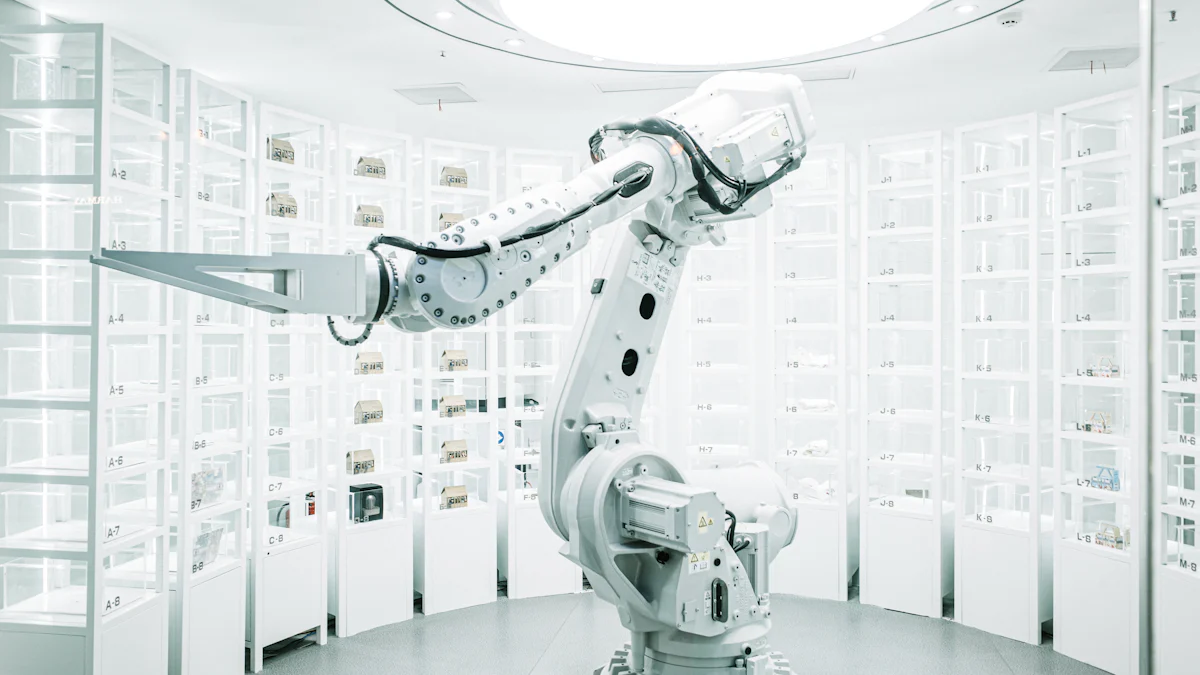How Small Businesses Can Seamlessly Adopt AI Technology

AI technology transforms the business landscape. Small businesses cannot afford to miss out on this revolution. AI automation for small businesses enhances operations and boosts efficiency. Almost half of small business owners plan to try AI tools soon. This trend shows AI's growing importance. A significant number of small businesses report improved customer experiences after adopting AI. Investing in AI helps small businesses stay competitive. Embracing AI ensures you stay ahead in a rapidly evolving market. The future looks bright with AI by your side.
Understanding AI Technology
What is AI?
Definition and key components
AI stands for Artificial Intelligence. AI refers to machines that mimic human intelligence. These machines can learn, reason, and solve problems. Key components include machine learning, natural language processing, and robotics. Machine learning allows computers to learn from data. Natural language processing helps machines understand human language. Robotics involves machines performing tasks.
Types of AI relevant to small businesses
Small businesses can benefit from several types of AI. Chatbots provide customer support 24/7. Predictive analytics helps forecast sales trends. Image recognition assists in inventory management. Voice assistants streamline scheduling and reminders. Each type offers unique advantages for business growth.
Benefits of AI for Small Businesses
Efficiency and productivity improvements
AI boosts efficiency in many ways. Automation handles repetitive tasks. Employees focus on more important work. AI tools analyze data faster than humans. Quick analysis leads to better decision-making. According to Investopedia, AI tools improve efficiency significantly. This improvement translates to higher productivity.
Cost savings and revenue growth
AI technology saves money for small businesses. Automation reduces labor costs. Predictive maintenance prevents costly equipment failures. AI-driven marketing targets the right audience. Targeted marketing increases sales and revenue. The Small Business and Entrepreneurship Council’s 2023 Survey found that 83% of small business owners plan to invest in AI. These investments aim to achieve cost savings and revenue growth.
Steps to Seamlessly Adopt AI
Assessing Business Needs
Identifying the right areas for AI automation for small businesses can feel overwhelming. Start by examining current operations. Look at tasks that take up a lot of time or resources. Think about where AI could make things easier. For example, consider using AI in customer service or inventory management. Once you spot these areas, set clear objectives. Define what success looks like with AI integration. Maybe you want faster response times or more accurate sales forecasts. Clear goals help measure progress and ensure AI meets your needs.
Choosing the Right AI Tools
Selecting the best tools is crucial for AI automation for small businesses. Evaluate available AI solutions. Look at options like Salesforce or HubSpot for CRM needs. Consider ChatGPT for chatbots or TensorFlow for machine learning. Check if these tools align with your business goals. Budget and scalability are important too. Small businesses often have limited funds. Choose tools that fit your budget but can grow with your business. Reliable customer support is also vital. Good support ensures a smooth adoption process.
Implementing AI Solutions
Training is a key step in AI automation for small businesses. Employees need to understand how to use new tools. Provide comprehensive training sessions. Make sure everyone knows how AI will change their work. Integration with existing systems is another step. Ensure AI tools work well with current software. This might involve some technical adjustments. A seamless integration prevents disruptions. Successful implementation leads to smoother operations and better outcomes.
Monitoring and Optimization
AI automation for small businesses doesn't stop at implementation. You need to keep an eye on how well AI tools perform. Tracking performance and outcomes helps you understand the impact on your business. Use metrics like response times, customer satisfaction scores, and sales growth to gauge success. CRM software like Salesforce and HubSpot offer built-in analytics features. These tools can help you monitor AI's effectiveness in real-time.
Tracking performance and outcomes
Monitoring AI automation for small businesses involves regular checks. Look at how AI tools handle tasks compared to human efforts. Check if AI-driven processes save time or cut costs. Use data from AI systems to identify trends or patterns. For instance, IBM Watson Decision Platform can analyze vast amounts of data. This platform predicts future outcomes with high accuracy. Such insights help you make informed decisions about pricing or marketing strategies.
Making necessary adjustments
Sometimes, AI automation for small businesses needs tweaks. If AI tools don't meet expectations, consider adjustments. Maybe training sessions need improvement. Perhaps integration with existing systems requires fine-tuning. Regular feedback from employees can highlight areas needing change. Encourage staff to share experiences with AI tools. Their input can guide necessary modifications. Keep an open mind and remain flexible. AI technology evolves rapidly, so staying adaptable ensures long-term success.
Real-World Examples and Case Studies

AI automation for small businesses can lead to remarkable transformations. Real-world examples offer valuable insights into successful AI adoption. Let's explore some stories and lessons learned.
Successful AI Adoption Stories
Case study 1: XYZ Corp's AI-driven customer service
XYZ Corp decided to enhance customer service using AI automation. The company implemented AI chatbots to handle customer inquiries. These chatbots provided 24/7 support, which improved response times. Customers appreciated the quick assistance. The company saw a boost in customer satisfaction rates. AI automation for small businesses like XYZ Corp can lead to significant improvements in service offerings.
Case study 2: ABC Inc's AI-enhanced supply chain
ABC Inc faced challenges in managing its supply chain. The company turned to AI automation to optimize inventory management. An AI-based platform helped predict demand and manage stock levels. This approach reduced overstock and stockouts. ABC Inc experienced cost savings and increased efficiency. AI automation for small businesses can transform supply chain operations.
Lessons Learned from Failures
AI automation for small businesses doesn't always go smoothly. Learning from failures helps avoid common pitfalls.
Common pitfalls to avoid
Small businesses often rush into AI adoption without proper planning. Lack of clear objectives leads to confusion. Businesses sometimes choose AI tools that don't align with their needs. Inadequate training results in poor tool usage. Avoid these pitfalls by setting clear goals and selecting appropriate tools.
Strategies for overcoming challenges
Overcoming challenges requires a strategic approach. Start with a pilot project to test AI solutions. Gather feedback from employees and customers. Use this feedback to make necessary adjustments. Continuous monitoring ensures AI tools meet evolving business needs. AI automation for small businesses thrives on adaptability and learning.
Future Trends and Resources

Emerging AI Technologies
Innovations on the horizon
AI technology continues to evolve rapidly. New innovations promise to revolutionize small businesses. Imagine AI tools that predict customer behavior with pinpoint accuracy. Businesses can tailor marketing strategies like never before. AI-driven analytics offer insights into market trends. Companies can make informed decisions quickly. AI-powered automation streamlines operations. Small businesses save time and resources. The future holds exciting possibilities for AI in business.
Potential impact on small businesses
Emerging AI technologies will impact small businesses significantly. Enhanced customer experiences become the norm. AI tools improve communication and engagement. Businesses gain a competitive edge in the market. Streamlined inventory management reduces costs. AI solutions optimize supply chains. Small businesses see growth opportunities. AI investment becomes a strategic priority. Business owners focus on customer service and sales growth. AI technology transforms small businesses into industry leaders.
Additional Resources
Books, articles, and online courses
Learning about AI technology is crucial for small business success. Many resources are available to help you understand AI. Books like "Artificial Intelligence: A Guide for Thinking Humans" provide valuable insights. Articles on platforms like Forbes and Harvard Business Review offer expert perspectives. Online courses from Coursera and Udemy teach AI fundamentals. These resources equip you with knowledge to harness AI's potential.
Networking and community support
Networking plays a vital role in AI adoption. Connect with other small business owners who use AI. Join online forums and communities. Share experiences and learn from others. Attend AI-focused events and conferences. Engage with industry experts and thought leaders. Community support fosters collaboration and innovation. Together, small businesses can navigate the AI landscape successfully.
AI technology offers small businesses a chance to transform operations. AI boosts efficiency and cuts costs. Small businesses can start the AI journey today. Begin with simple tools like chatbots or predictive analytics. Training employees ensures smooth integration. Monitoring performance helps optimize AI solutions. AI evolves rapidly, so staying updated is crucial. Resources like online courses and networking events provide valuable insights. AI will play a vital role in small business success. Embrace AI to stay competitive and grow. The future looks promising with AI as a partner in business.
See Also
Maximizing Business Potential with AI Automation Agencies
Selecting the Optimal AI Automation Agency for You
Driving Innovation Across Sectors with AI Automation
Exploring the AI Automation Agency Market: A Comprehensive Overview
